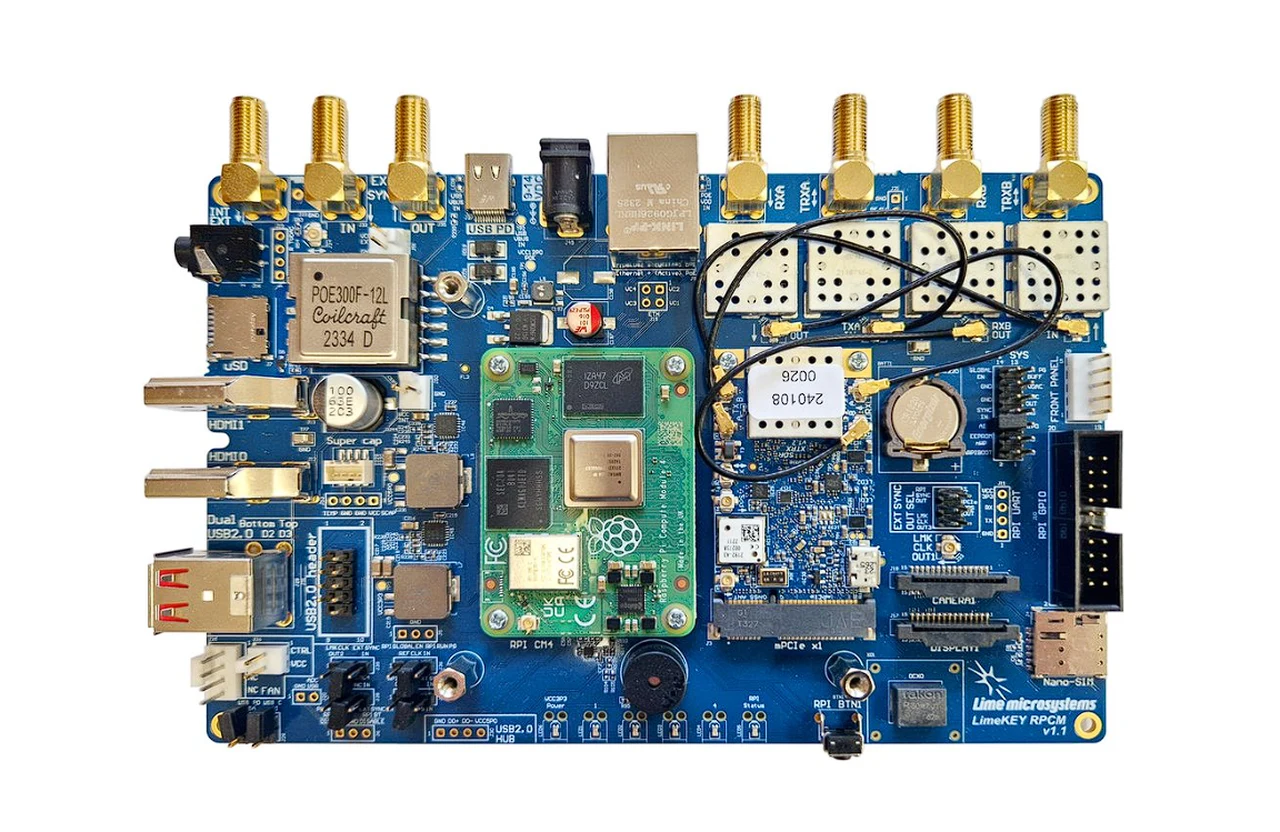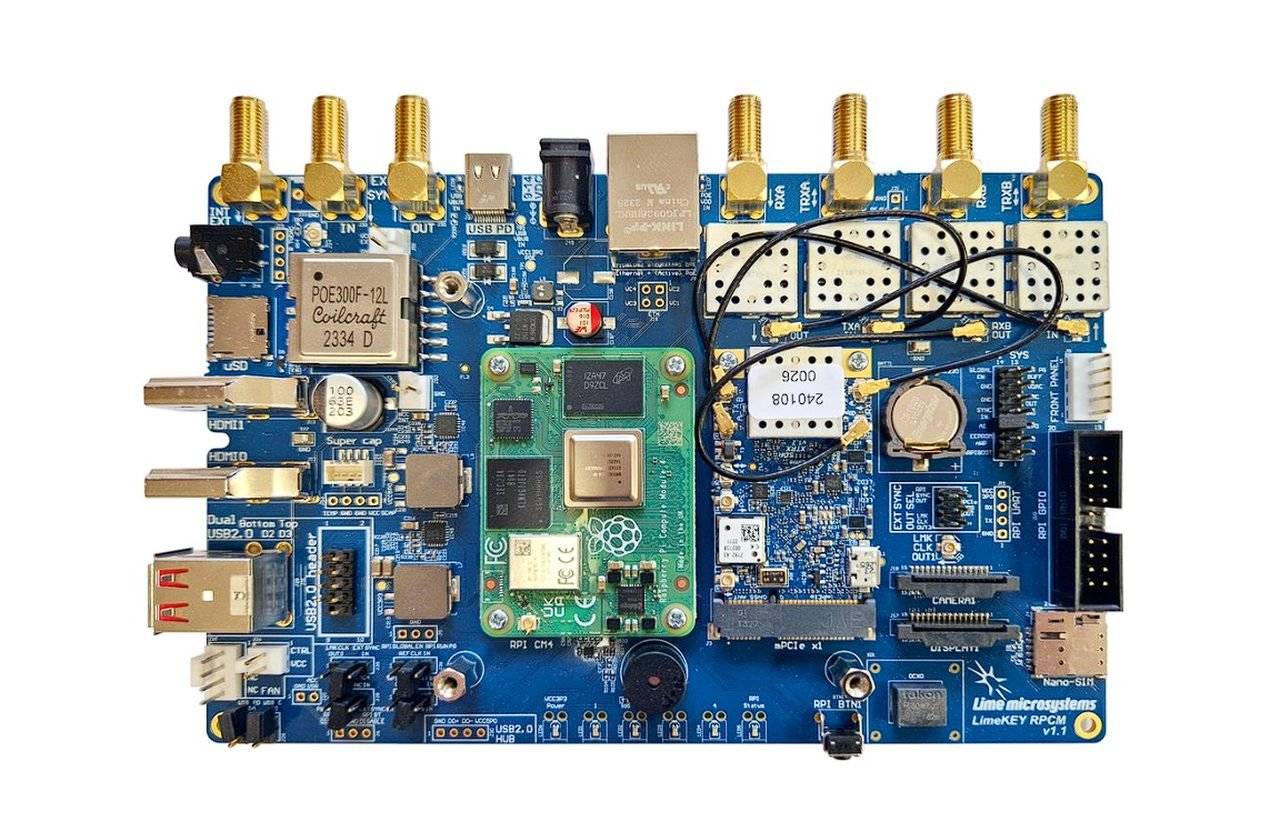
If you are working on a project that requires a powerful, flexible radio platform. You need something that can handle a variety of wireless tasks, from simple hobbyist projects to complex professional applications. Enter the LimeNET Micro 2.0, a new tool that’s been crafted to meet the demands of developers and professionals like you in the field of wireless communication.
At the heart of the LimeNET Micro 2.0 is its seamless integration with two key components: the Raspberry Pi CM4 and the LimeSDR XTRX. This combination provides you with a robust foundation for both embedded computing and advanced wireless tasks. The platform is designed to be user-friendly, with USB 2.0 Type-C for straightforward booting and power, as well as extra USB ports for connecting various devices.
You’ll appreciate the speed and efficiency of data transfer, thanks to the onboard Gigabit Ethernet. Plus, the convenience of Power over Ethernet (PoE) means you can reduce clutter by using a single cable for both power and data. If you need to add more capabilities, the Mini PCIe x1 Gen 2 interface has got you covered, allowing you to attach a wide range of peripherals.
LimeNET Micro 2.0
Visual and audio quality haven’t been overlooked. The LimeNET Micro 2.0 boasts dual HDMI 2.0 outputs, enabling you to enjoy 4K resolution at 60Hz. It also includes interfaces for connecting displays and cameras, as well as an audio and composite video port. Whether you’re setting up a digital signage system or creating a multimedia hub, this platform can handle it.
When it comes to storage and cellular connectivity, the LimeNET Micro 2.0 is equipped with a MicroSD card slot and a NanoSIM socket. It also features a variety of RF connectors, such as SMA and U.FL, which are crucial for connecting antennas and RF devices. This is essential for anyone looking to build a robust wireless setup.
The platform is built with expansion and customization in mind. It includes Raspberry Pi CM4 GPIO and SYS headers, which allow you to connect external devices easily. There are also connectors for additional displays, UART0 headers, and fan connectors, ensuring that the platform can support a broad range of peripheral devices.
One of the standout features of the LimeNET Micro 2.0 is its enhanced frontend module (FEM). It’s equipped with Qorvo drivers and amplifiers that significantly increase output power and coverage range. The FEM also includes low noise amplifiers (LNAs) and switches that support both FDD and TDD modes, which are crucial for effective wireless communication.
The LimeNET Micro 2.0 is a comprehensive platform that offers a wide array of features and improved specifications. It’s an invaluable tool for anyone looking to explore the possibilities of wireless technology. Whether you’re experimenting or implementing professional solutions, the LimeNET Micro 2.0 is designed to help you innovate and succeed in your wireless projects.
Features & Specifications
LimeNET Micro 2.0 provides access to all of the connectivity and functionality of the CM4 and LimeSDR XTRX boards at its heart. That includes:
- USB 2.0 Type-C socket (boot and power delivery)
- Dual USB 2.0 Type-A sockets (downstream ports) or a front-panel USB 2.0 header (unpopulated)
- Gigabit Ethernet jack with PoE support
- Mini PCIe x1 Gen 2 (5 Gbps)
- 2x HDMI 2.0 receptacles (up to 4K 60P supported)
- 2x 15-pin FPC connectors for MIPI DSI display and CSI camera
- 3.5 mm, 4-pin jack for analog audio and composite video
- MicroSD card slot
- NanoSIM socket
- Coaxial RF (4x SMA female + 4x U.FL female) connectors for RF frontend
- Coaxial pass-through U.FL to external SMA connector
- 20-pin Raspberry Pi CM4 GPIO header (3.3 V)
- 14-pin Raspberry Pi CM4 SYS header
- 5-pin front display connector (power, I²C, button)
- Raspberry Pi CM4 UART0 header (unpopulated)
- 2-pin and 4-pin fan connector at 5 V (default), 3.3 V, or VCC_INT voltage
Filed Under: Hardware, Top News
Latest timeswonderful Deals
Disclosure: Some of our articles include affiliate links. If you buy something through one of these links, timeswonderful may earn an affiliate commission. Learn about our Disclosure Policy.

